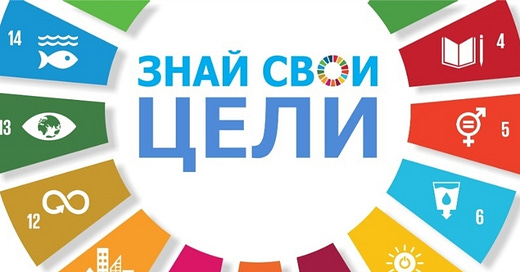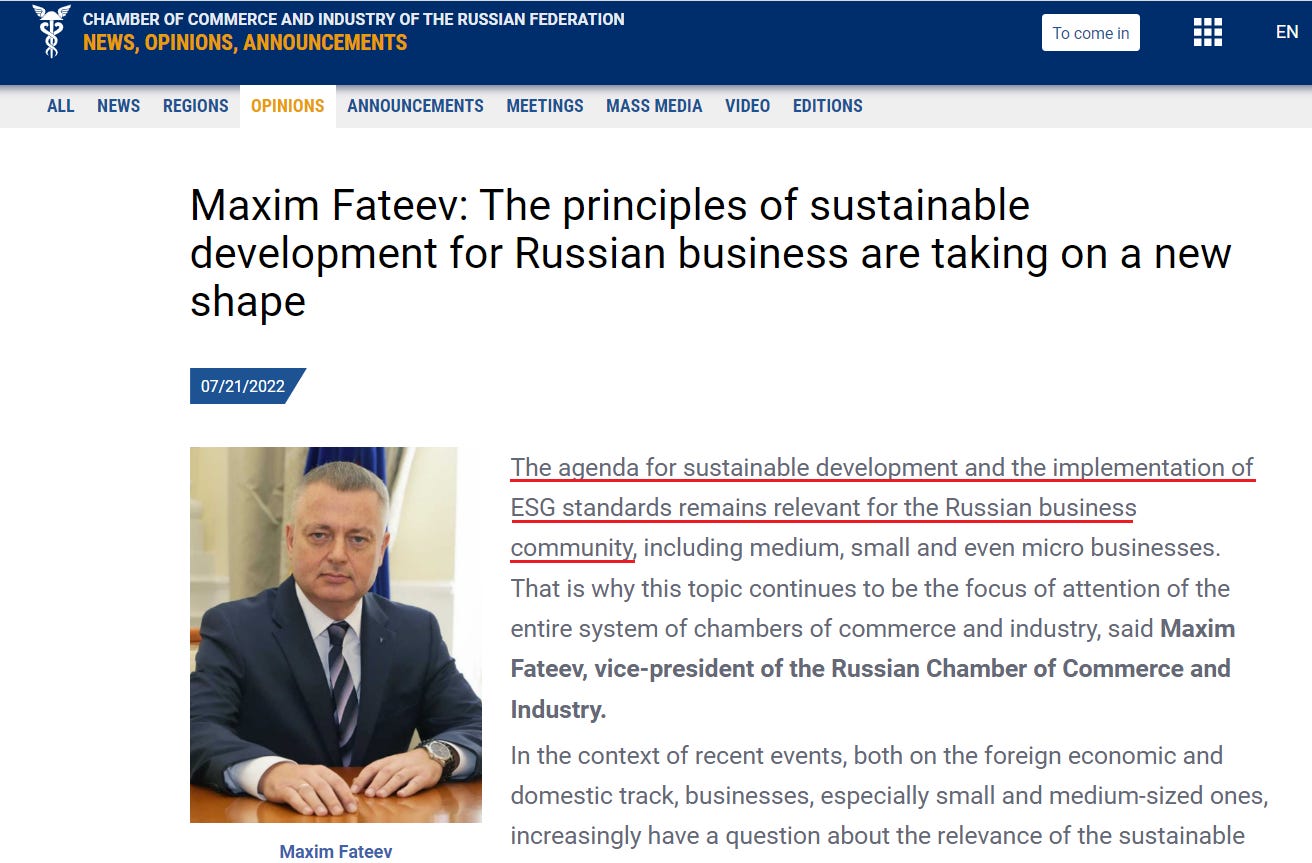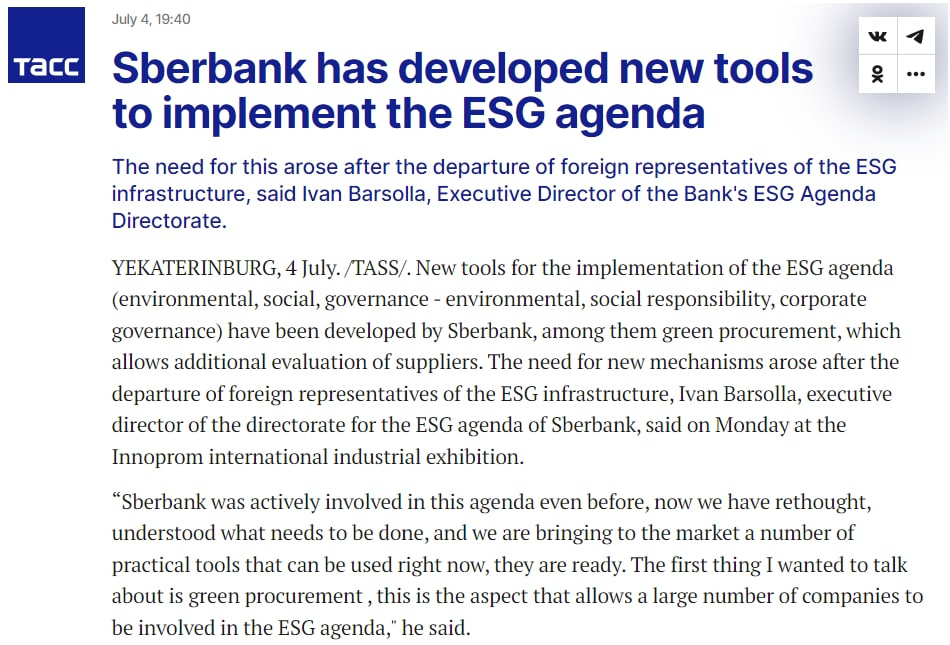Russia's "sustainable development" cult is decadent & depraved
The "ESG agenda" has powerful supporters in Russia. This is bad?
New evidence suggests Russia’s cabal of oligarchs (sorry, “merit-based collective of friendly business leaders”) has been binge-drinking the Sustainability Kool-Aid. Perhaps it’s time for an intervention?
We naively believed Herman Gref was Russia’s leading ESG witch doctor, but as it turns out, the Russian Chamber of Commerce and Industry, a club of 40,000 business enterprises, also actively practices Green Voodoo.
The organization’s vice president, Maxim Fateev, typed up the following environment-saving sorcery on July 21, 2022:
Some juicy excerpts:
In addition to the external track, there are also requirements for the Russian market. Just the other day, within the framework of the forum “Strong Ideas for the New Times” held by the Agency for Strategic Initiatives, a specialized section devoted to environmental technologies was held. It was noted that the VEB.RF strategy stipulates that all projects in which VEB Group participates must comply with ESG standards in the SDG [Sustainable Development Goals] methodology. Thus, one of the main investors in our country defines the principles of ESG as important and relevant.
According to our estimates, this is primarily due to the fact that the sustainable development goals are focused on each of us, citizens. To improve the level and quality of our lives, solve environmental and social problems, build management models based on a focus on people as the main value.
That is why, in our opinion, this topic is relevant for medium, small and even micro businesses. Because these are, first of all, people, citizens of our country. And so this topic continues to be the focus of attention of the entire system of the Chamber of Commerce and Industry of the Russian Federation. Chambers of Commerce and Industry in the regions are actively interacting with entrepreneurs, including to inform them about the main trends and basic principles of the ESG agenda. […]
According to our estimates, an integrated approach is needed that will help solve not only climate problems, but also social problems, tasks to change the system of business perception and management.
The climate agenda for small and medium-sized businesses is not just reporting, auditing the carbon footprint and calculations to reduce it, it is a set of measures that affect the quality of life of a person, his thinking. It is no coincidence that the issue of developing education in the field of ecology from the school curriculum to business education is being discussed more and more actively.
Large companies are developing separate programs, including in cooperation with the system of secondary and higher education, and the country’s leading universities are opening separate master’s programs on sustainable development. It is an integrated approach that will speed up the solution of the tasks of preserving the environment and responding to climate change. And all this is impossible without the participation in the process of all business entities, business associations, the scientific and expert community.
Not only are Russia’s leading businesses reciting ESG incantations, they’re calling for the country’s education system to join their cult so that future generations will be able to continue their sustainable development crusade.
But there’s more (of course).
On July 4, Sberbank announced it had developed “new tools” for assessing ESG compliance in Russia. Because now that the western ESG nannies are gone, how will Russian firms receive their Sustainability certificates?
Gref has heard your cries for help; have no fear, Gref is here:
“Sberbank was actively involved in this agenda even before, now we have rethought, understood what needs to be done, and we are bringing to the market a number of practical tools that can be used right now, they are already ready. The first thing I wanted to talk about is green procurement, this is the aspect that allows a large number of companies to be involved in the ESG agenda,” [Ivan Barsolla, executive director of the directorate for the ESG agenda of Sberbank] said.
According to him, foreign investors who were the driver of the agenda, representatives of the ESG infrastructure, and international certification bodies have recently left Russia. Domestic companies have been excluded from ESG ratings. All this imposed a number of difficulties in the implementation of the agenda.
Barsolla said that the green procurement tool allows customers of goods and services to put forward additional requirements for suppliers on the ESG agenda, and evaluate them according to the methodology developed by Sber. Companies, in turn, receive a certificate of conformity.

BONUS ESG EXTRAVAGANZA: Rumored fugitive-from-justice Anatoly Chubais has vowed to help develop renewable energy in Russia! What a legend.
According to Twitter, Chubais fled Russia in March and now lives in constant fear of being hacked to death with an ice axe.
It’s true he left Russia; but under what circumstances?
Maybe we’ll never know. But it really doesn’t seem like Chubais is worried about inexplicably falling out of a window or something—because he recently gave an interview to TASS in which he disclosed he was still actively participating in developing “renewable energy” in Russia:
“My goal is not the post of chairman of the Association for the Development of Renewable Energy (ARVE), but the renewable energy industry itself in Russia. While I helped this post, I held it. When it became clear that replacing me would help renewable energy, I myself initiated the replacement of the co-chairman. This is also important because I expect an attack on renewable energy in Russia. And although it is professionally unfounded, it will be politically motivated. I remain a member of the ARVE presidium and in this capacity I am going to continue supporting renewable energy in Russia,” he told TASS on Tuesday.
What is ARVE, exactly? From the group’s website:
The Association for the Development of Renewable Energy (ARVE) is a non-profit organization representing the interests of participants in the renewable energy sector in Russia and leading activities to create a favorable investment climate and promote the use of renewable energy sources in the Russian Federation.
ARVE is the leading expert and communication platform in Russia in the field of energy based on renewable energy sources.
We will bring together a wide range of stakeholders, including generating companies, developers of renewable energy projects, manufacturers and suppliers of equipment, research centers and financial institutions, in order to jointly ensure the formation of a reliable institutional environment and an effective infrastructure for investment in the renewable energy sector.
The organization has an office in Moscow, and its membership roster includes Rusnano, the state-funded company that nearly went bankrupt under Chubais’ leadership.









Renewable energy for Russia!?! What they really mean is wind & solar. Powering Russia with wind & solar would be like trying to grow pineapples in Norway. They do have a good hydro resource but they are expensive to develop, way too limited in size, environmentally destructive, vulnerable to drought and the long distance transmission is very expensive and vulnerable to sabotage. Even ESG rarely funds hydro. And never funds nuclear.
Russia has excellent light water reactors, the VVER-1100 and also has Fast Reactors that use a trivial amount of fuel. If they REALLY cared anything for the environment and climate change Russia would be pushing hard on nuclear just as China now is. That's the only sensible path to a low carbon future for Russia and it makes all this crap about ESG, carbon footprint, carbon trading, carbon credits absolutely worthless, in fact less than worthless, of negative effectiveness. Birdbrains, Russia has one path forward on climate change mitigation and that is build nuclear power plants. And since Russia is the largest exporter of Nuclear Power on Earth, why don't they get massive carbon credits for every NPP they export? How come schlock Western Companies, like Amazon or Microsoft get carbon credits for funding solar or wind farms in Developing nations but no credits for NPP exports? ESG is a scam. Unlike wind & solar, nuclear actually does reduce carbon emissions.
https://www.bloomberg.com/news/features/2021-11-02/china-climate-goals-hinge-on-440-billion-nuclear-power-plan-to-rival-u-s
Your "Carbon Footprint" is a LIE (and we all fell for it):
https://www.youtube.com/watch?v=G_zjhp5HyfI
From Red to Green was the autobiography of Bahro. Bahro, who developed his critique within a Marxist framework, accused the Communist Party leadership of betraying socialist ideals. Characterizing the states of Eastern Europe as systems of organized irresponsibility, he analyzed their political economy and aspects of their industrial production. He recommended far-reaching reforms of the administrative apparatus—indeed, an overhaul of the entire political structure. In Bahro’s view, the Eastern Bloc was not merely an example of deformed socialism, but rather a social reality based on entirely different principles. He accused the Soviet leadership of having, through its invasion of Czechoslovakia in 1968, robbed itself and the peoples of Eastern Europe of the experience of socialism with a human face. He demanded true economic democracy, without wage privileges for tiny elites, and also the elimination of the existing division of labor. Genuine institutional self-rule, Bahro declared, must gradually develop from below, with freedom of personal development a necessary condition. He believed that a coalition drawing from all political tendencies could lead the way out of self-imposed imprisonment. All this was conceived as a new vision of communism. Altogether some 300,000 copies of The Alternative were sold, and the book was translated into numerous other languages.
“Bahro … remains as committed as ever to the vision of a classless society. He sees the ecology crisis as a direct result of the capitalist industrial system [a system taken over lock, stock and barrel by the socialist states) ; he looks to material interests as the ultimate force behind social change—an interest in survival that is ‘more material’ than any economic interest.”
But nor is Bahro Gorz, draping a green veil over an old, decrepit and discredited project. (For a brilliant debunking of Gorz’s Ecology as Politics, see Bookchin’s Towards an Ecological Society. Regrettably it’s the only brilliant material in the book.) There is much in Bahro that is not new: much of what he says echoes Murray Bookchin in the sixties. Nor does his critique seem to me to be as radical as that of Camatte, Lewis Mumford, or the Fifth Estate. Nevertheless, he is deeply involved in a movement that is practically as well as theoretically confronting the megamachine; more of the real project that lies before us comes through his work than through the work of any other marxist “interpreter” of the ecological critique.
Bahro’s central thesis runs along these lines: We face today an ecological crisis of threatening, global dimensions. This crisis is a direct result of capitalist industry, an industry which, according to Bahro, “is driven on by a boundless need to valorize capital, to make value into more value.” This limitless need threatens to destroy the natural base of human life and at the same time “poses the old question of ‘socialism or barbarism’ with an intensity that earlier socialists, for all their farsightedness, did not even dream of.” He states that the future of the “entire social body” is in question, speaking urgently of the imminent results of our suicidal mode of existence: “The present way of life of the most industrially advanced nations stands in a global and antagonistic contradiction to the natural conditions of human existence. We are eating up what other nations and future generations need to live on.” If these nations complete their goal of industrializing the world, life on this planet will be destroyed. This process may take a hundred years, he tells us, and will be caused not necessarily by lack of resources but by the systematic destruction of the biosphere.
In the context of Neo Liberal Russia and the WEF Leninists, Bahro provides a bridge to today. From Green to "Blue" shall we say, or call this curious hybrid a Watermelon. Green on the outside.